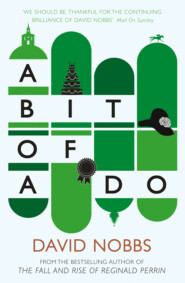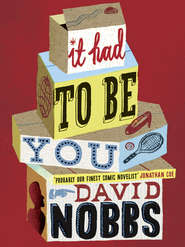По всем вопросам обращайтесь на: info@litportal.ru
(©) 2003-2025.
✖
The Fall and Rise of Gordon Coppinger
Автор
Год написания книги
2018
Настройки чтения
Размер шрифта
Высота строк
Поля
‘I’ve taken the liberty of talking to the Earl about this, Sir Gordon,’ said Peregrine, ‘and we’ve arrived at a round figure, a very round figure, which we think is fair, in no way excessive, and which acknowledges that this is a relatively small work, and a watercolour, and his watercolours do not historically fetch as much as his oils.’
‘I would be prepared to sell this picture to you,’ said the Earl in his modulated tone, ‘for twenty million pounds.’
‘Fine,’ said Sir Gordon. ‘Consider the deal done.’
They shook hands. Sir Gordon was again bathed in the warm glow of the saviour. The Earl was relieved. Peregrine Thoresby was as excited as a child.
Sir Gordon felt happy as Kirkstall drove them speedily back to the Coppinger Tower. He was now the proud owner of Storm Approaching the Solway Firth. He was blissfully unaware that this was just the first of many storms that would approach, and that all the others would come a great deal nearer than the Solway Firth.
Those insidious doubts (#ulink_5b6d5cc1-c151-5e6a-ac24-c847a7367688)
The entry in his diary read, ‘6.30. Dorchester. DDT (Kranjčar and Modrić)’. Using the names of real people gave him a tiny frisson of risk. It was unlikely that Her Grimaldiship would recognize Kranjčar and Modrić as Tottenham Hotspur players, but it was just possible, and that element of insecurity added salt to the stew of deception.
‘Well, Helen,’ he said as he reached her desk. ‘I’m off to see the Croatians.’
‘Give my love to the Dorchester.’
‘I will.’
Did other people have conversations as fatuous as that? he wondered. (Wondering again! What was going on with all this wondering? he wondered. And that was wondering again.)
‘May I ask what DDT stands for?’
‘Of course, Helen. You have every right to know.’
Their eyes met. A stab of desire caught him off guard. He was always vulnerable at the start of one of his naughty evenings.
Did she sense his sexuality? He thought she did. He thought he could see it in her eyes. He’d have to be careful. He ought to leave. A quickie with Helen was definitely not in the plan.
‘It’s the Dubrovnik Development Trust.’
‘And what’s that all about?’
‘Developing Dubrovnik.’
‘I’m sorry I asked.’
He lowered his voice.
‘This is very hush-hush, Helen, but I can trust you.’
Her square face softened. She really did believe he was going to the Dorchester to meet two Croatian businessmen. What an opportunity.
‘We’re planning to build a shopping mall inside the walled city. I’m helping to fund it – for a substantial return, of course.’
‘Inside the walled city. You can’t. It’d ruin it. Where inside the walled city?’
‘Near the harbour, at the end of that big long tiled main street.’
‘But that’s the best bit. You can’t do this. I love Dubrovnik.’
He knew that.
‘It’s ravishing.’
And once I ravished you. No!
‘Why? Why, Sir Gordon?’
‘To keep the cruise ships away. They have up to five huge ships a day, pouring people in – in their ghastly shorts with their hideous white veined legs and their paunches and their tattoos, filling the bars and the shops and the restaurants, making life for the natives utterly intolerable. They have to make it ugly to survive.’
God, it was just believable.
He gave her a quick kiss on the cheek and noticed that she had the faint beginnings of a moustache. That really turned him on. He hurried away from the danger.
As he strode through the open-plan office, a few people were still at their desks. It was five to six.
‘Well done,’ he called out. ‘Your diligence has not gone unnoticed.’
Kirkstall drove him to the Dorchester, dropped him off and went to park. As soon as his chauffeur was safely out of the way, Sir Gordon went outside and hailed a taxi. In the taxi he thought about the evening ahead. He was never at his best in taxis. Rich though he was, and even though he had just offered to buy a painting for £20 million, he hated the way the meter clicked up, up, up. He tried to ignore it, but found his eyes drawn back to it. ‘That’s one pound, twenty just for waiting at these lights,’ he would say. Christina had once pointed out that he resented spending on taxis but paid a fortune to gardeners. ‘They don’t have meters on their foreheads,’ he had said.
So now, in the taxi, it was natural that his thoughts should veer towards the negative.
Barely thirty-six hours had passed since that disturbing awakening, when he’d decided that he must end it with Mandy. But then he’d thought of that as a sign that he was going soft.
Should he end it? Were people becoming alerted to his sexploits, as the tabloids would no doubt call them? Insidious doubts began to assail him. Was he still invulnerable? Would his sexual appetite destroy him? Shouldn’t he concentrate on his great work, his collection, his charitable foundation, his football team? Men with missions should be single-minded. What would his staff in those great organizations and his workers in his factories and all the people in the Coppinger Tower think if they knew that their esteemed leader stared at the meters of taxis in horror? What would they think if their charismatic hero was splattered across the tabloids as a sex addict?
Oh God, was he a sex addict? He hoped not. It didn’t sound good when he read about other people who were sex addicts. They had to have treatment, for goodness’ sake. How intolerably embarrassing that would be.
If only, with his appetite, his virility, his needs, his strength, he could resume sexual relations with Christina. It really was rather extraordinary that he couldn’t.
He would have to grasp that nettle.
No, he must give Mandy up. She had served her purpose.
As he climbed the stairs to the second floor of her block of flats in Hackney – there was no lift – he noticed again that there was no smell of drains. The smell occurred only inside the flat, yet it was so faint that it seemed to be drifting in from outside. A conundrum! A conundrum that might perhaps have been easily solved if only Germophile had … but he must stop thinking about Germophile.
There she was, beaming plumply, sexy and generous, far too aroused for him to even contemplate disappointing her. He would let her down gently later. He owed her that much.
There was a smell of something else, dominating even the distant drains. It was the faintly sweet, temptingly disgusting aroma of cooking lamb. She had made one of her shepherd’s pies.
They kissed hungrily, hurried to the bedroom, tottered on to the bed, clawed at each other’s clothes – they couldn’t get them off fast enough. He raised her rate of interest, he made his deposit, it was urgent, it was a meeting of needs, it was a contract, it was the execution of an agreement, it was over.
It had always struck him as pathetic that she tried to lay an attractive table in her cramped kitchen-diner. There was a single, rather tatty rose in a cheap vase. There was a flickering candle which would deposit wax over the Formica that wasn’t even retro. She had placed the mats for the veg without a vestige of spatial awareness. The salt and pepper pots were dumped inelegantly in just the wrong place. It was a disaster, but she had tried. It made a vivid contrast to luncheon at Flaxborough Hall, where elegance hung in the air like a memory.
She would have to go.
He couldn’t tell her just now, or, if he did, he would have to leave before the meal. He wasn’t that cruel, to leave her with two portions of shepherd’s pie to eat through her tears. Besides, the portions had not been generous at luncheon, and a man is always hungry when he has just agreed to pay £20 million for a picture.











